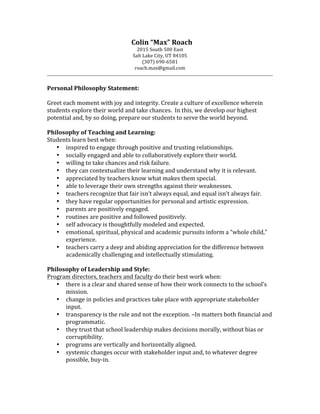
C. Max Roach- Personal Philosophy and Favorite Quote
- 1. Colin “Max” Roach 2015 South 500 East Salt Lake City, UT 84105 (307) 690-‐6581 roach.max@gmail.com Personal Philosophy Statement: Greet each moment with joy and integrity. Create a culture of excellence wherein students explore their world and take chances. In this, we develop our highest potential and, by so doing, prepare our students to serve the world beyond. Philosophy of Teaching and Learning: Students learn best when: • inspired to engage through positive and trusting relationships. • socially engaged and able to collaboratively explore their world. • willing to take chances and risk failure. • they can contextualize their learning and understand why it is relevant. • appreciated by teachers know what makes them special. • able to leverage their own strengths against their weaknesses. • teachers recognize that fair isn’t always equal, and equal isn’t always fair. • they have regular opportunities for personal and artistic expression. • parents are positively engaged. • routines are positive and followed positively. • self advocacy is thoughtfully modeled and expected. • emotional, spiritual, physical and academic pursuits inform a “whole child,” experience. • teachers carry a deep and abiding appreciation for the difference between academically challenging and intellectually stimulating. Philosophy of Leadership and Style: Program directors, teachers and faculty do their best work when: • there is a clear and shared sense of how their work connects to the school’s mission. • change in policies and practices take place with appropriate stakeholder input. • transparency is the rule and not the exception. –In matters both financial and programmatic. • they trust that school leadership makes decisions morally, without bias or corruptibility. • programs are vertically and horizontally aligned. • systemic changes occur with stakeholder input and, to whatever degree possible, buy-‐in.
- 2. • changes occur at a rate that reflects thoughtfulness and promotes the change’s sustainability. • policies and practices are positive in nature: reflect positive assumptions. – even when having conversations about difficult topics. • they feel appreciated and trusted. • they share laughter and joy with the faculty, parents and students around them. Schools perform best when: • there is a shared sense of place, person and mission. • practices are carefully aligned with the school’s mission. • attention is given, in appropriate and prioritized measure, to advancement, admissions, business office practices, curriculum and teaching practices, parent involvement and community outreach. • faculty and staff feel valued and heard, even when the decision is not one they originally promoted. • there is a clearly communicated value statement, which is aligned with constituents’ needs and desires. • they connect to outside organizations that share mission alignment (such as universities, companies, etc.). • a sense of stability pervades stakeholder perceptions, but not at the cost of stagnancy. • board governance is aligned with best practices, respecting a clear distinction between daily decisions and setting policy that guides the school forward. Favorite Quote: Learning is finding out what you already know. Doing is demonstrating that you know it. Teaching is reminding others that they know just as well as you. ― Richard Bach, Illusions My, Gallup Pole “Strengths Finder,” Top 5 Strengths: 1. Relator 2. Empathy 3. Communicator 4. Competitor 5. Responsibility *See Gallup Poll Strengths Finder 2.0 Book-‐ Roth for more information.